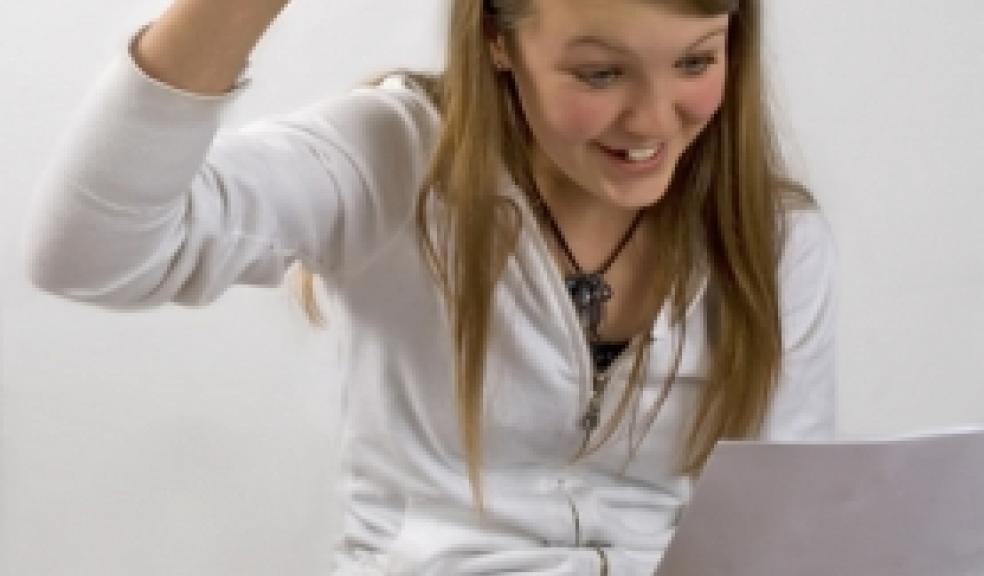
Rising numbers studying but fall in top grades as GCSE students receive results
Students in Plymouth have been discovering their GCSE results today (Thursday 22 August) across the city's schools, academies and colleges.
For many, results and grades will have an impact on their further studies whether at A level or via other further education courses.
For schools, the numbers of students attaining A to C grades has a direct impact on their league table ratings.
Numbers taking GCSEs up, but top grades fall
- Decline in percentage of A*-C
- Significant rise in 15 year olds taking GCSEs brings down overall results
- Increase in IGCSEs impacts on GCSE outcomes in certain subjects
- Evidence of significant early and repeated entry in Mathematics throughout the year
- New, more challenging examination standards in the sciences
- Boost for languages and humanities
Amid the tension, delight and disappointment of results day, 2013 has seen a second successive fall in the numbers of students receiving top marks (A-C), according to the Joint Council for Qualifications (JCQ).
The small decline continues the trend begun in 2012, when a reverse in a long running annual upward trend in students' grades was seen.
The JCQ figures show the number of GCSEs taken across England, Wales and Northern Ireland in 2013 increased by 4.2 per cent compared with 2012 (5.2m to over 5.4m). This significant rise can be attributed to the number of GCSEs taken by those aged 15 years and younger increasing 39.0 per cent to 806,141.
The proportion of GCSEs awarded A* is down this year by 0.5 percentage points from 7.3 per cent to 6.8 per cent, while the proportion achieving top grades between A* and C is also down, 1.3 percentage points to 68.1 per cent.
Results in the South West broadly mirror that trend, with a fall of 1% in those attaining a grade A and a fall of 1.3% in grade C results.
Nationally, across all subjects, girls continued to outperform boys at A* (8.3 per cent compared to 5.3 per cent) and at A*-C (72.3 per cent compared to 63.7 per cent).
Commenting on this year’s GCSE results, Michael Turner, Director of the Joint Council for Qualifications, said:
“Students have worked hard for these results and should be congratulated for their efforts and their achievements.
“There are many underlying factors affecting this year’s GCSEs, including a sizeable increase in entry by 15-year-olds, new science specifications designed with greater challenge, early and multiple entry in Mathematics and an increase in the number of students taking IGCSEs. All of these have had an impact on entries and results.
“This year’s upturn in languages will be welcomed across the education sector and beyond. Not since 2008 have there been this many entries in languages. However, it remains to be seen if this is the start of a trend and if more students decide to continue to study a language at A level.”
Further detail
English
The increase in entries from those younger or older than 16 can be seen in GCSE English. In 2013, there were over 61,000 more entries compared with 2012 with 41.9 per cent of this increase coming from 15 year olds.
Results for 16 year olds remained relatively constant, especially at A*.
The overall decline in top grades in English can, therefore, be explained by younger students not performing as strongly as 16 year olds.
While there has been an increase in IGCSE entries in English, this does not appear to have had an impact on outcomes.
Mathematics
The number of entries for Mathematics increased by 12.5 per cent to 760,170, with the largest increase seen in the 15 year old age group.
There were significant early and repeated entries for Mathematics throughout the year, with an additional 565,833 entries outside of the Summer series.
Results for 16 year olds remained virtually unchanged at A*-C (up 0.1 percentage points to 62.1 per cent) but declined slightly for 15 year olds (down 0.3 percentage points to 51.7 per cent).
As with English, Mathematics shows 15 year olds performing less well than 16 year olds across the top grades.
Sciences
Entries for the separate sciences continued to climb, with Biology increasing 5.0 per cent; Chemistry 4.4 per cent; and Physics 2.1 per cent.
Boys have traditionally dominated entries for separate sciences, but this year’s figures show girls are closing the gap. In Physics, entries by girls increased 6.5 per cent compared with a 1.7 per cent decrease for boys.
Results in separate sciences declined. This can be explained in part by 2013 being the first examination of new specifications that were deliberately more demanding. Other factors contributing to the decline in results for Biology, Chemistry, Physics and Additional Science this year include high performing students switching to the IGCSE; an increase in 15 year olds, who perform less well than the main cohort; and a continuation of the trend that is seeing more students moving away from double science to the separate sciences, but this group being of lower ability than those who have traditionally taken separate sciences.
An increase in entries for IGCSEs, predominantly in the sciences, has caused a change in the profile of the cohort and had an impact on GCSE results. While there has been a small drop in the overall outcomes for GCSEs and IGCSEs, the drop for GCSEs alone is greater. For example, in 2013 the percentage of A*s for IGCSEs and GCSEs combined is down only 0.1 percentage points, compared with 0.5 percentage points for GCSEs alone.
Languages
Following years of decline, this year’s results show a dramatic rise in the number of entries for GCSE languages. Entries for traditional languages (French, German, Spanish) are up 16.9 per cent compared with last year (French up 15.5 per cent; German up 9.4 per cent; Spanish up 25.8 per cent). Of the three, only Spanish increased last year. French remains the most popular language taken by students with 177,288 entries.
Other modern languages rose by 5.1 per cent compared with a rise of 13.7 per cent in 2012. The most popular other modern languages are: Italian 5,136 entries; Urdu 4,519 entries; Polish 3,933 entries; Arabic 3,607 entries; and Chinese 3,042 entries.
Humanities
There were also significant rises in the number of entries for Geography and History. Geography rose 19.2 per cent (3.5 per cent in 2012) and History rose 16.7 per cent (2.0 per cent in 2012).
GCSE short course
The number of GCSE Short Course entries in 2013 fell significantly by nearly 100,000 to 274,017 (26.2 per cent drop). Religious Studies remains the most popular subject with 174,364 entries.
GCSE double award
The decline in the Double Award continues this year, with over 15,000 fewer entries compared with last year (a 36.3 per cent drop).













